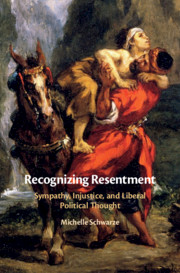1 - Vicious Passions
Resentment and Sociability before Butler
Published online by Cambridge University Press: 02 October 2020
Summary
In the first chapter of Recognizing Resentment, I historically situate the debate about the passions and their role in sociability to which Joseph Butler responded at the outset of the eighteenth century. I correct the mischaracterization of the seventeenth cenutry as the age reason reigned supreme, highlighting instead how a host of philosophers in the rationalist tradition began to pay particular attention to the importance of passion in moral and political motivation and obligation. For rationalists and psychological egoists like Thomas Hobbes, Baruch Spinoza, and John Locke, passions were influential but socially destabiizing and “vicious.” The same was true of the philosophy of the father of the natural law tradition, Hugo Grotius. However, Grotius's disciple, Samuel von Pufendorf, and the heir to the egoist tradition in the eighteenth century, Bernard Mandeville, began to view the passions in a new light. However vicious they might be, Pufendorf and Mandeville believed passions positively contibuted to our ability to live together in large, diverse societies.
Keywords
- Type
- Chapter
- Information
- Recognizing Resentment , pp. 25 - 45Publisher: Cambridge University PressPrint publication year: 2020

